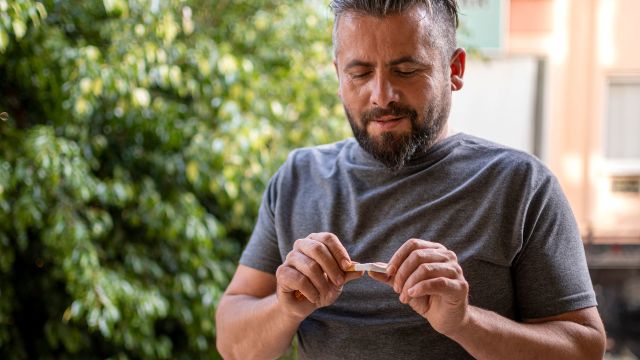Many people think smoking is a long-term stress reliever, but it’s not. Smoking only relieves the stress of nicotine withdrawal between cigarettes. Each time you smoke, cigarettes release toxins into your body, causing chronic stress.
To deal with that short-term stress between cigarettes, think about other ways you can respond to your smoking cravings. Everyone who quits smoking fights the urge to light up at one time or another, even if they take advantage of medication quit aids. While it’s usually the toughest during first few days and weeks, you may get cigarette cravings years after quitting.
How to deal with smoking triggers
A trigger is anything that sets off your desire to smoke. Certain places, actions or times of day may bring about a greater urge to light up. Figuring out what your triggers are makes it easier to eventually cut back and quit. Here are some common smoking triggers, and what you should do when they strike.
If you smoke when drinking coffee: Find another activity to start your day. Call or text a friend. Read the newspaper. Make breakfast. Also consider cutting back on caffeine. Your metabolism’s response to caffeine changes when you quit, so you may feel stronger effects from the same amount.
If you smoke when you drink: Think about giving up booze for now. You can always have a cocktail again when you feel you have quit for good.
If you smoke after meal: Take a walk instead. Regular exercise can help you reduce those smoking cravings.
If you smoke when driving: Start taking alternate routes to your destinations. Avoid passing any place where you regularly purchased cigarettes.
If you smoke when stressed: Find a different outlet. Meditate, exercise or talk with a friend or family member. Work through your problems instead of turning to cigarettes.
If you smoke during work breaks: Find a new, smoke-free area to spend your break or try a little lunchtime exercise. Walk around the parking lot or climb up and down the stairs.
If you smoke while watching TV or using a computer: Maintain focus on the activity you are doing. Keep your hands busy by squeezing a stress ball while watching TV. You can also do a crossword puzzle, Sudoku or a game on your phone—anything that keeps both your hands and mind occupied.
If you smoke while talking on the phone: Take your call in a different room of the house or outside on a walk. Exercise while chatting by lunging around the house or doing squats.
If you smoke with a buddy: Find nonsmoking activities to do together. Sometimes it’s best to avoid your smoking companion or the places you lit up together until you feel confident in your ability to stay cigarette-free. Better yet—convince them to quit with you.
Way to stay smoke-free
These strategies can help keep cravings for tobacco at bay. Practice them when you feel stressed and want to reach for a cigarette. The more you practice, the better prepared you will be when the urge to smoke hits you.
Stay busy
Keeping your brain occupied prevents you from thinking about smoking. If you have idle time in your day, fill it by reading a book, going to a movie, taking a walk or engaging in a hobby. Visit places where smoking isn’t allowed.
Keep your mouth busy
Stock your house with healthy snacks. Try sucking on sugar-free hard candy or munching on carrot or cinnamon sticks. Drink water when a craving strikes.
Keep your hands occupied
Many people find they miss having a cigarette in their hands. Keep a pencil handy for fidgeting. Using a hand grip exerciser may help relieve stress—and tone your muscles, to boot.
Change your routine
If lighting up became a habit in certain situations, replace it with other activities instead. For example, if you always had a cigarette after dinner, change it up and take a walk after the evening meal.
Try yoga
A small 2011 study found that following one hour of abstinence from nicotine and a half-hour session of yoga, participants reported a decrease in smoking cravings across the board.
Exercise
Of all the alternative, non-medicinal forms of smoking cessation, exercise may be one of the most consistent and reliable ways to reduce cravings. If you don’t currently exercise, start by adding a daily walk to your routine.
Seek out support
To help with your underlying stress level, be sure you stay connected with friends and family to get support and share your feelings. Talk about your stressful situations with someone you trust. Seek professional help if needed.
Be mindful
Smokers trying to quit are often urged to take it one day—or hour, or minute—at a time. Mindfulness is the embodiment of that concept. It is all about staying in the present and being acutely aware of what’s going on in any given moment. It may sound like torture for someone fighting a craving, but a small 2016 study suggested that brief mindfulness practice reduced cravings compared to a control, and the mindfulness group also smoked less over two weeks.
Relax
Being anxious won’t help you quit. Instead give yourself a break. Try 10 to 20 minutes of meditation, which may bring relief from the stress of quitting. Use the time to listen to music, relax and try to think of pleasant things or nothing. And be sure you get enough sleep.
Be mindful of what your smoking triggers are—and develop the necessary strategies to avoid them. These actions can help you up for success when quitting. Instead of turning to cigarettes when stressed, arm yourself with healthier solutions.





